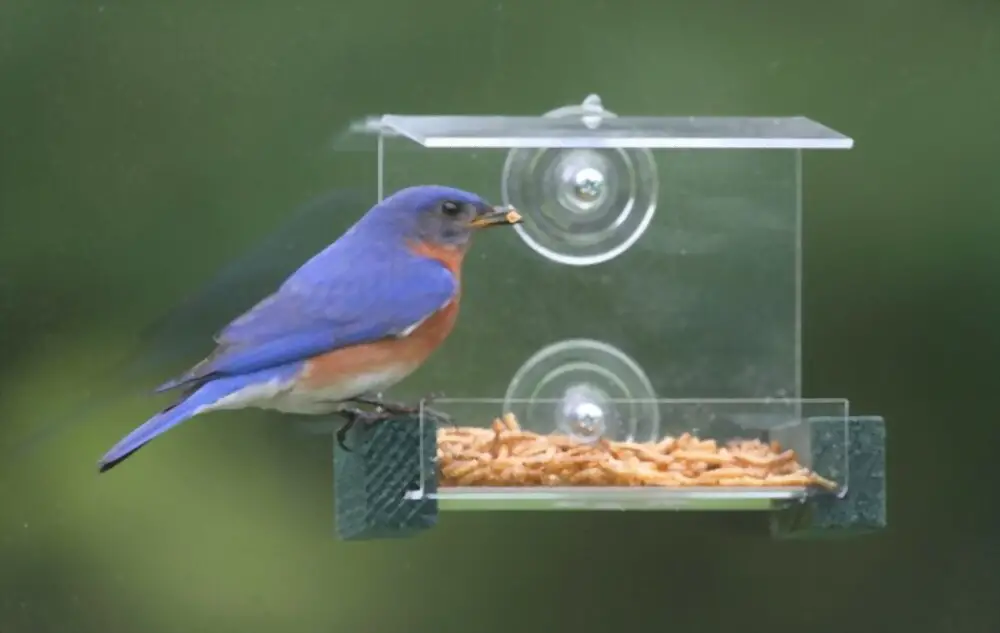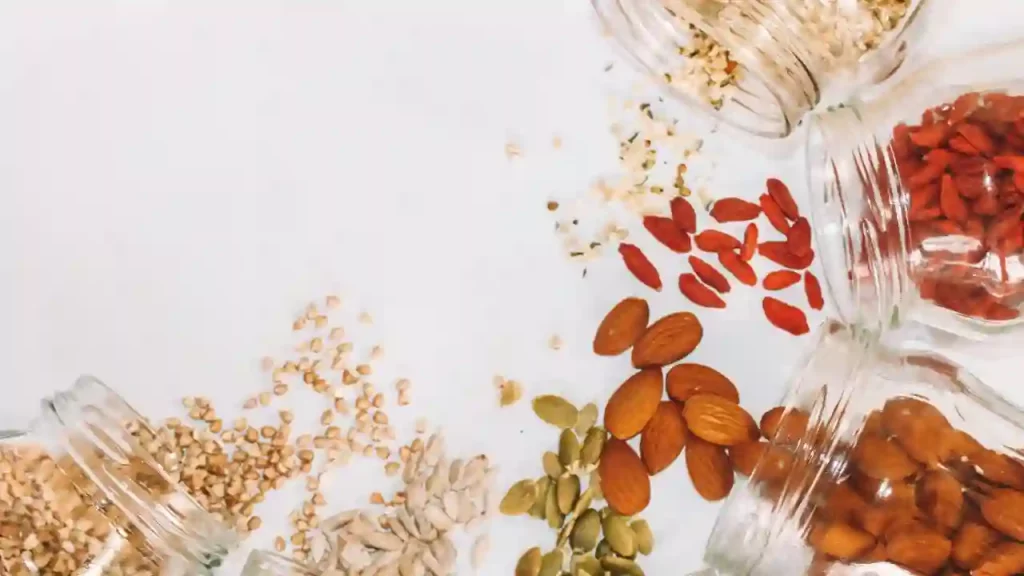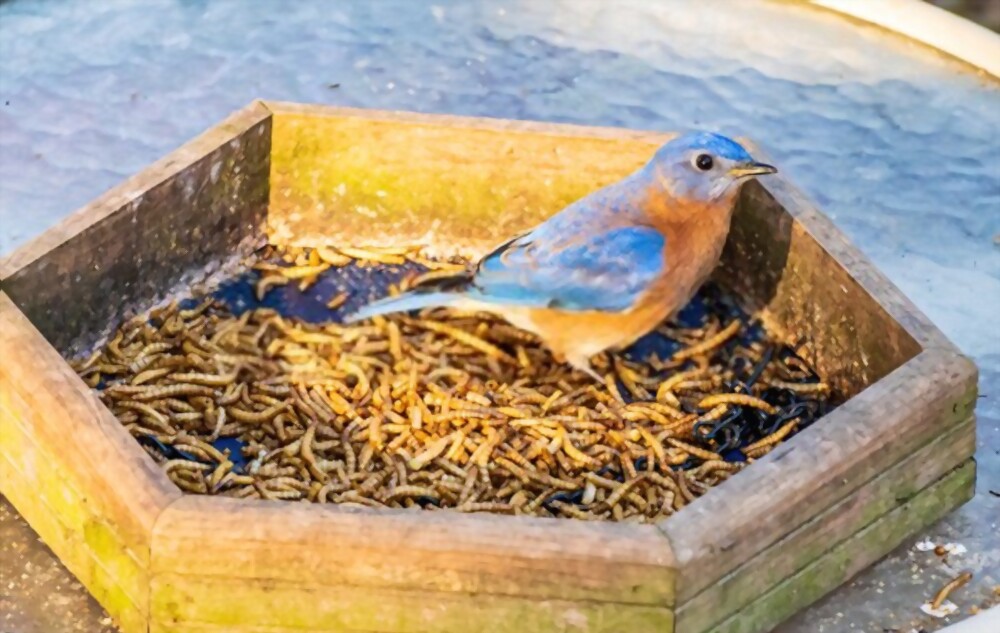For many of us, spring is marked by the lovely and distinctive song of bluebirds that many hear as chur-lee, chur-lee. We love to see our feathered friends with their shiny blue plumages nipping down to our backyard for a bite of food.
So, what do bluebirds eat? 99% of the diet of mountainous bluebirds comprises of insects while eastern and western bluebirds have roughly three quarters of their diet made up of insects, that is about 70%. Insects that bluebirds devour include:
- snail grubs, caterpillars, insect larvae
- grasshoppers, crickets, beetles, spiders
- flying insects like moths, termites, mosquitoes
Bluebirds are mainly insectivores and omnivorous. They are of three main types: eastern, western and mountainous. Thankfully, bird experts aka ornithologists, have put together data on what they eat so we can offer our friends food they like.
Prey is spied from their perch and then caught on ground. Occasionally, they catch insects in flight when it’s warmer and flying insects are in abundance.
Large insects with hard exoskeletons may be banged against the ground or a perch before consumption.
Bluebirds have a preference for caterpillars. Smooth, green caterpillars are preferred over dark green ones with spines because they lack chemical defences which are toxic to birds as they rely on camouflage.
The former ones have a high level of fats and keratin which make them easy to digest, boost the immune system, enhance eye vision, and give brighter plumage to attract mates.
What Do Bluebirds Eat In Winter?
The insect diet about which we were talking above is consumed only in spring, summer and early winter. When the weather conditions become rough, bluebirds shift to fruits and berries.
These berries are grouped over a wind range and include: dogwood, holly, mulberry, wild grape, creeper, pokeweed, and even poison ivy berries.
Migration in the winter season also depends on the availability of food sources. If there are small trees and vines which bear fruit, then bluebirds group and remain in the region for the winter. (Check our post do bluebirds migrate?)
In case the fruits are covered in snow due to heavy snow fall, then your role as a bird feeder comes in, which we will discuss in later sections.
What Do Baby Bluebirds Eat?
Nurturing of the nestling is done by both the parents. Baby blue birds get food from their parents which consists entirely of insects. They are offered food from a bird enthusiast if abandoned.
Typically, a fledgling can eat almost every food that an adult bird can eat.
What to Put in a Bird-Feeder?

In warmer months, from May to October, bluebirds can hunt out sufficient food for themselves. But in the winter season, they feed from bird feeders set out by bird enthusiasts. This does not mean you should offer food only in winter.
Their food consumption depends on season, habitat, activity level, and general food availability, so it should be offered all the year round. Here is a list of food that you can offer to your backyard visitors.
Meal worms:
Meal worms are the larval form of meal worm beetles. These crawlies are a treat for bluebirds. Rich in protein, mealworms act as a supplementary diet during the nesting season, for both the adult and the nestling.
You can buy them from many bird supply stores. Serving should be done in shallow glass or plastic trays with smooth surfaces so mealworms cannot escape before they are eaten.
But beware! They do not provide complete nutrition and can cause calcium depletion which is harmful for their growth. Hence, they should not be served at all times.
For better understanding, go through our article “Do bluebirds eat dried mealworms?”
Fruits:
A variety of fruits are consumed by bluebirds which include apples, oranges, grapes, raisins, blue berries, black berries, rasp berries, and currants.
But certain guidelines should be followed in serving them.
- Apples should be diced without peeling or coring
- Oranges must be cut into half rather than peeling
- Berries can be served whole or diced
- Soak raisins overnight in water and then serve
Suet:
Suet is a winter food and it will not be preferred by bluebirds in spring or summer when insects are in abundance. But in crude weather conditions, they will pack on this warm and energy filled, nutritious crumble.
Home-made suet is preferred over store-bought.
Here is an authentic suet recipe which you can easily make:
- 1 cup lard
- 1 cup crunchy peanut butter
- 1/3 cup sugar
- 1 cup whole wheat flour
- 2 cups oatmeal
- 2 cups cornmeal
- 11/2 cup raisins
Boil raisins and let them cool. Mix the dry ingredients together. Melt lard, peanut butter, and sugar in a sauce pan till they form a paste. Add the dry ingredients into the paste and then add raisins.
Let it cool and then store in the form of a crumble.
Seeds:

It is common knowledge that birds eat seeds but bluebirds are an exception.
They eat only sunflower chips, that is sunflower seeds, with the outside hull removed while the nut meat remains.
Bluebirds munch sunflower seeds only when they are at hand and no other foods are in store.
What Bluebirds Don’t Eat?
Bluebirds don’t eat whole peanuts, popcorns, whole sunflower seeds millet and mixed birdseeds, unlike other backyard birds. They are not fans of hummingbird nectar either.
How to Help Bluebirds Track Food?
Bird enthusiasts can also help bluebirds hunt food naturally even in their backyard. This can be done by planting bird friendly landscaping that includes berry bushes and fruit trees for birds. Holly berries, mulberry, and wild grapes can be planted.
Use of insecticides and pesticides should be minimized or eliminated for the abundance of insects.
Spider webs should not be swiped off so that spiders can be enticed to colonize, serving as a food source for bluebirds.
Summary
The above should provide a complete guide to help you understand the feeding habits of your blue-feathered friends. Bluebirds are naturally considered a farmer’s friend as they uproot destructive insects from crops.
Knowing about their diet and helping them consume it is a great way to preserve this species – one which is akin to the skies of North America.


